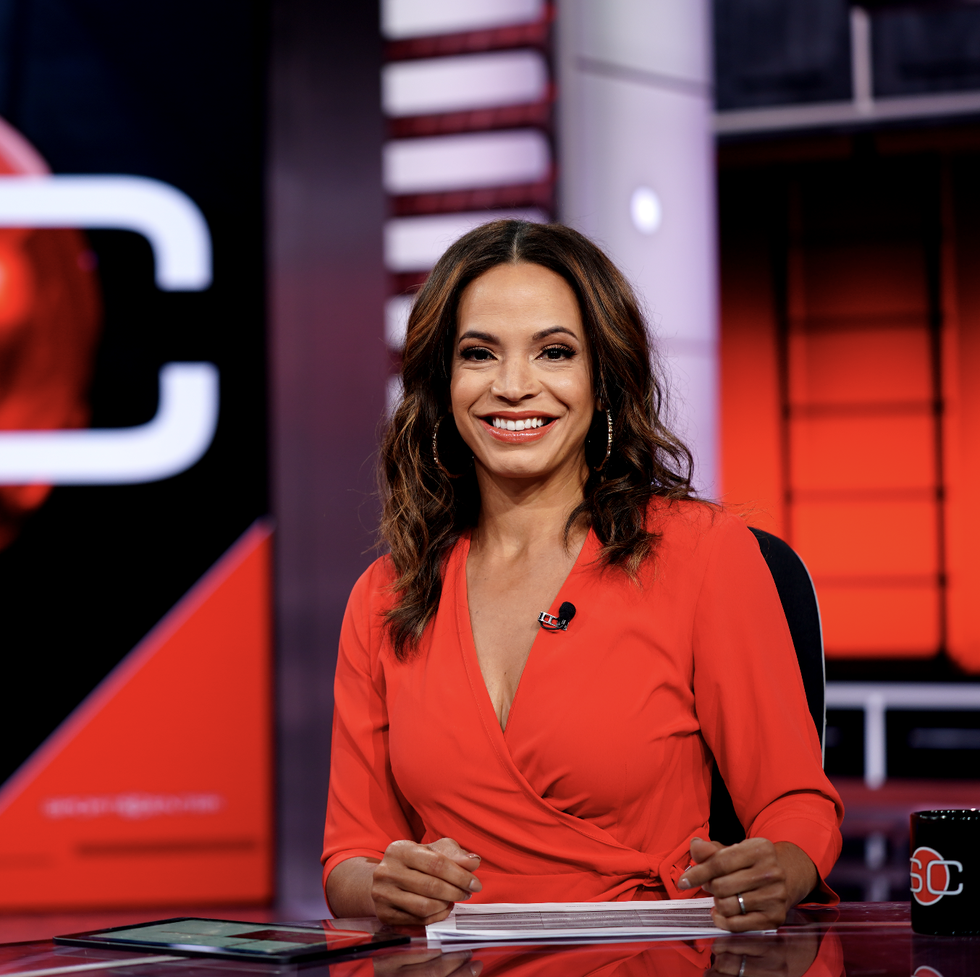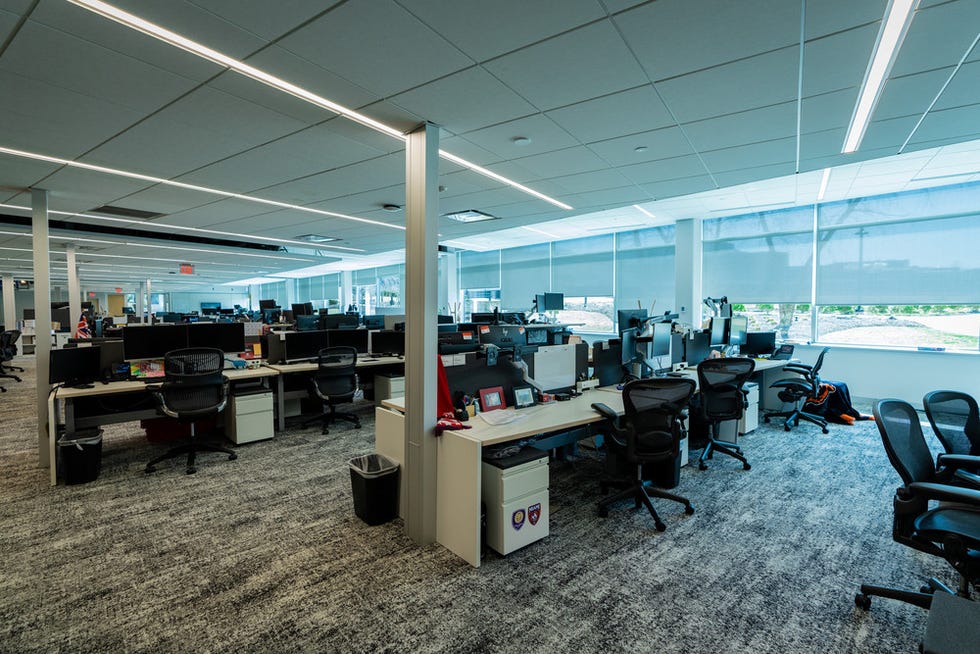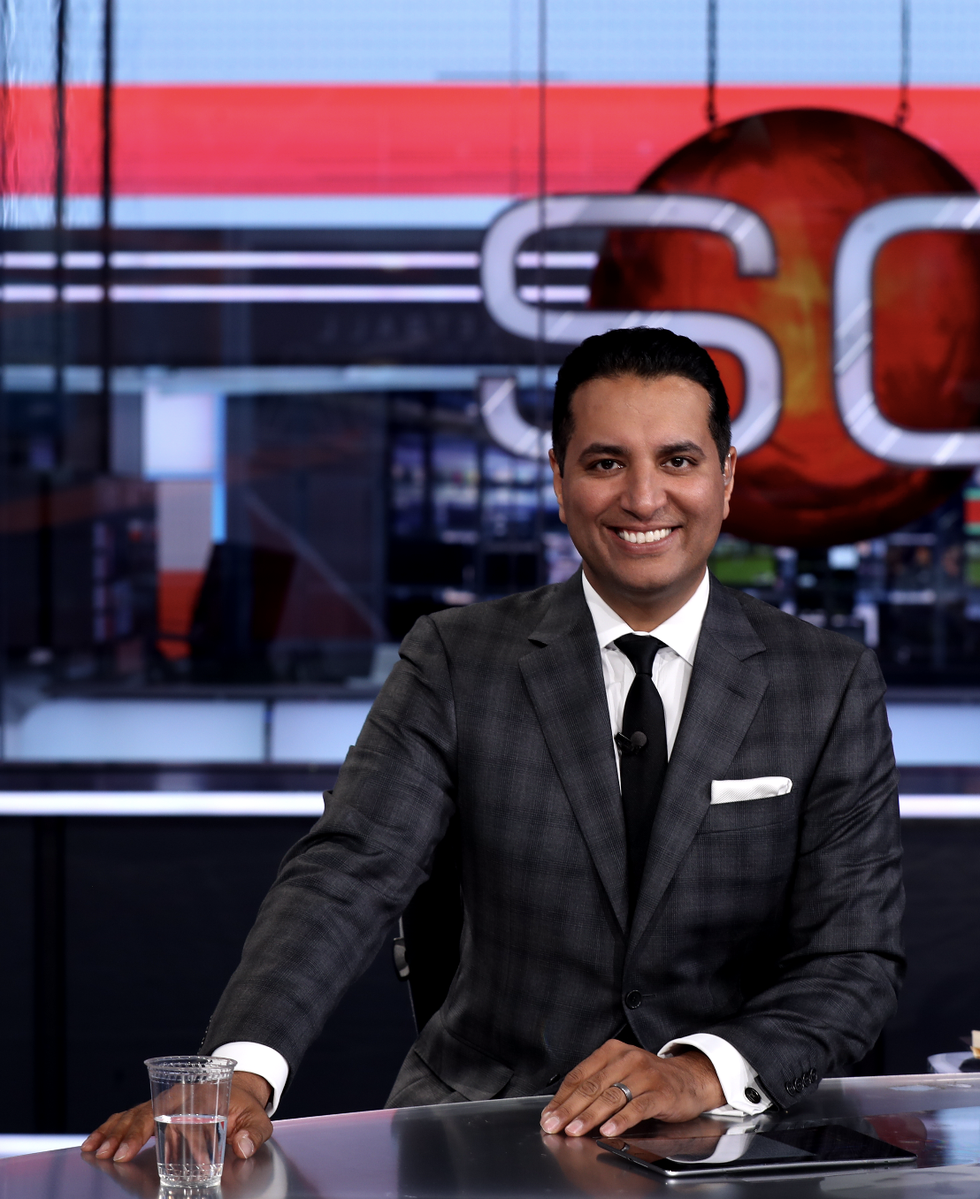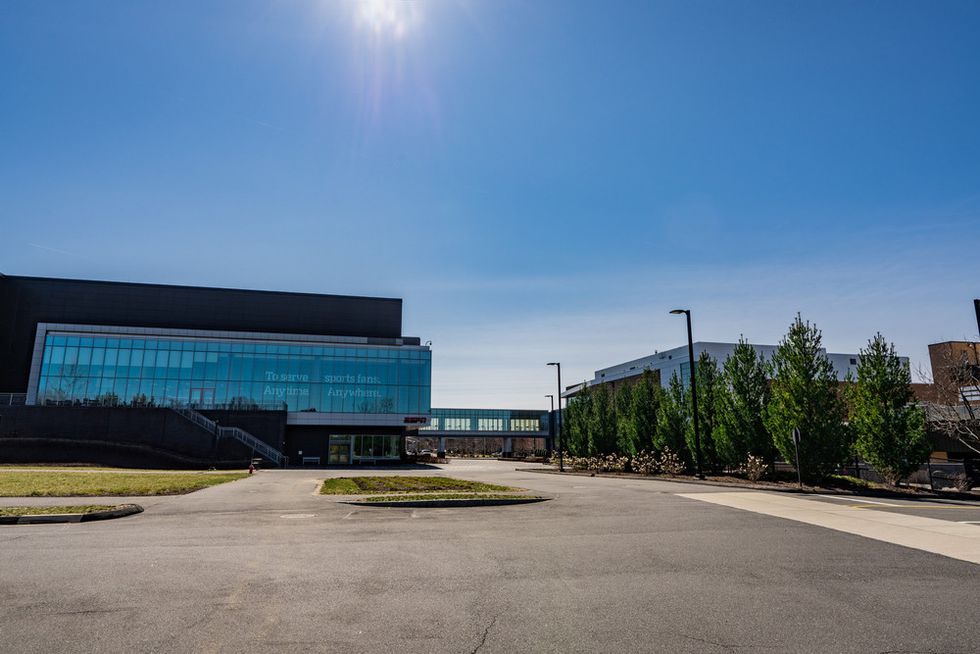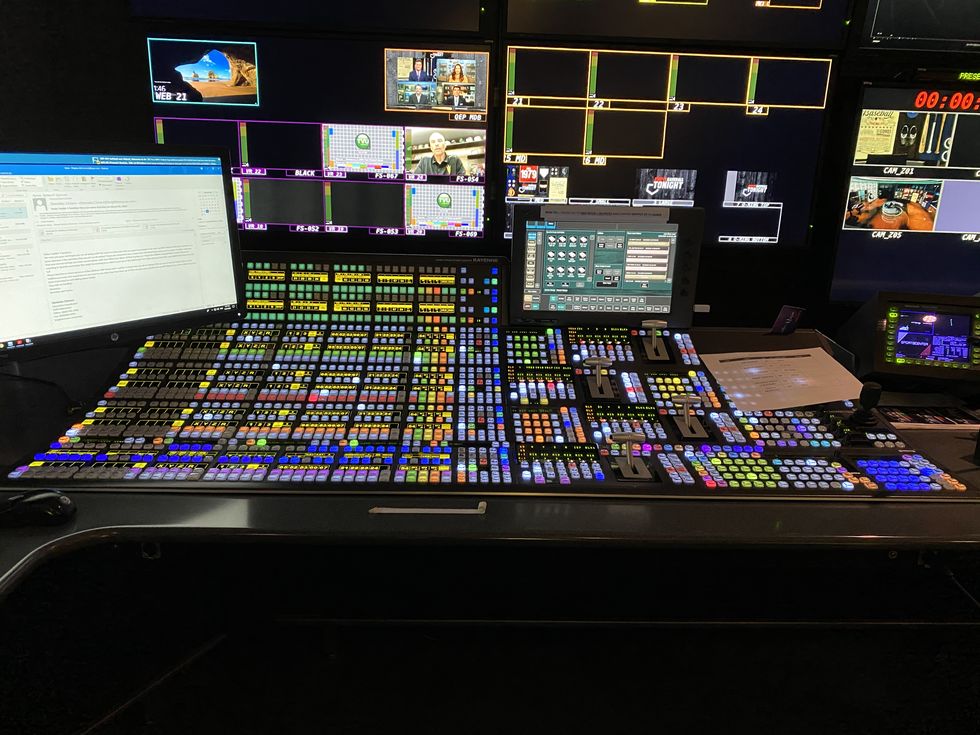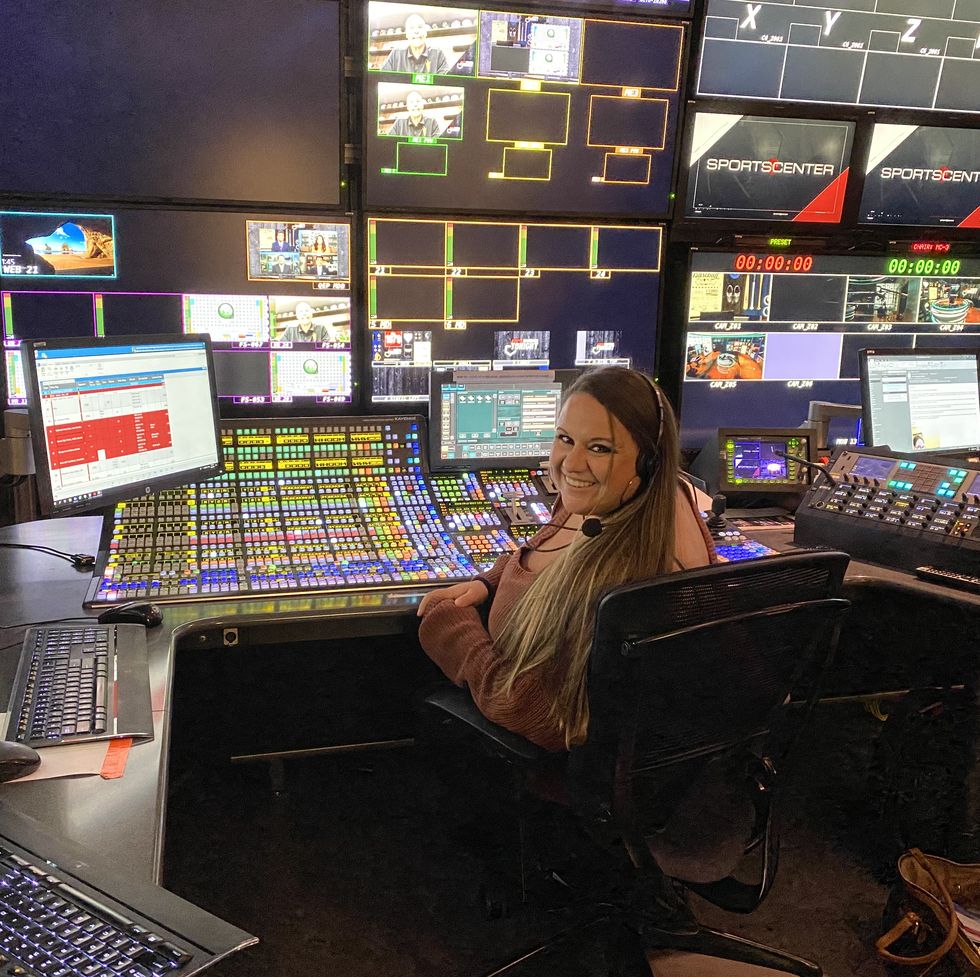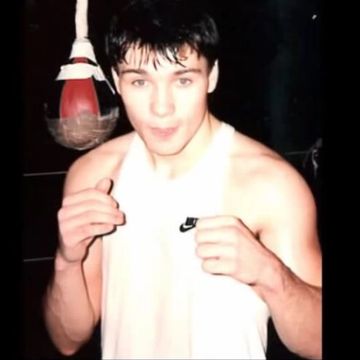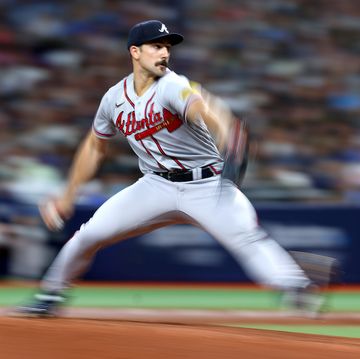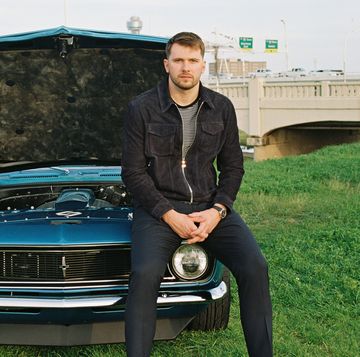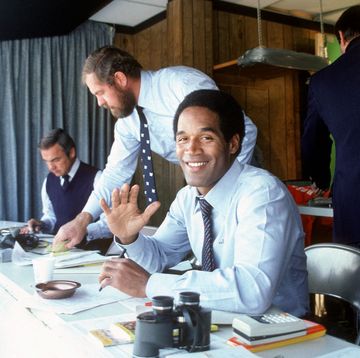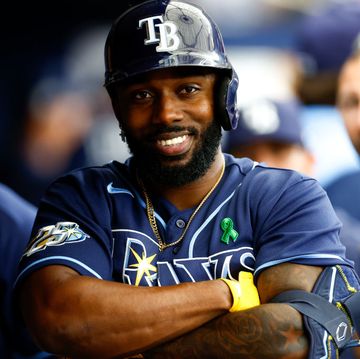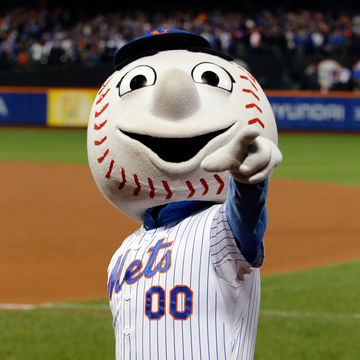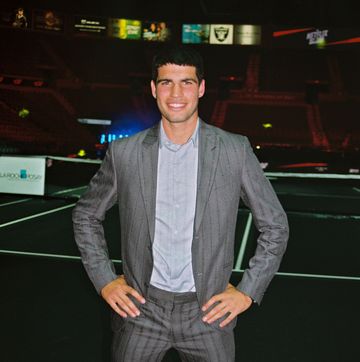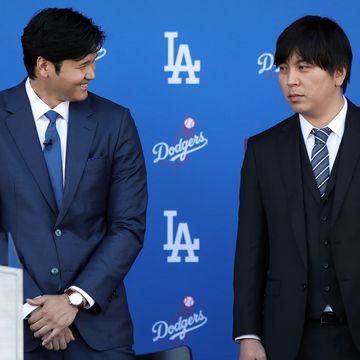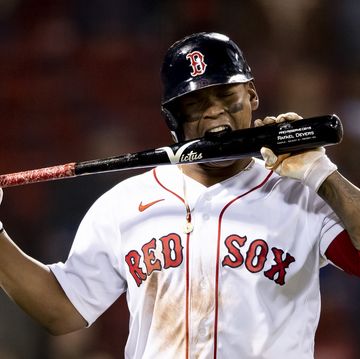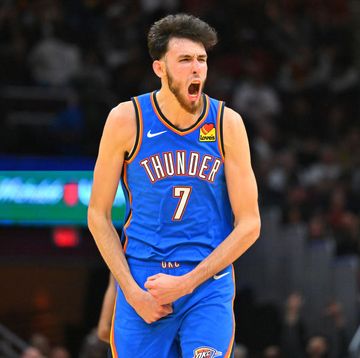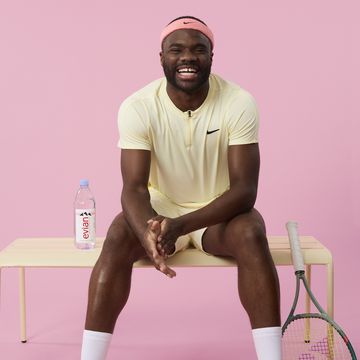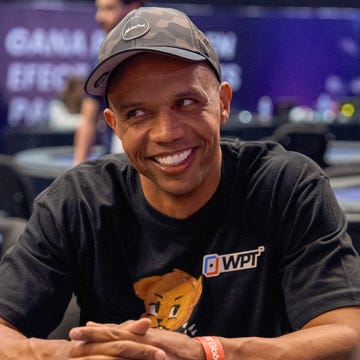On the day everything went to shit, SportsCenter anchor Elle Duncan drove to ESPN’s offices in Bristol, CT, thinking she’d be on air for a half hour, noon to 12:30, no co-anchor required. All she had to do was bridge First Take and the ACC Tournament. Easy.
Lights, cameras, THIS... IS… SPORTSCENTER, 10 minutes go by, all good. A producer, through Elle’s earpiece: ACC Tournament is shut down. All right, go to the college hoops guy, Rece Davis. We’re back. Producer, again: Big 12 Tournament, that’s done too. Break that. We’re going to Jeff Passan, looks like MLB is suspending operations. Back again. NHL is doing the same thing. Fuck. Thirty minutes turns into four hours, leagues dropping one by one. SportsCenter is losing the first half of its name in real time.
When Duncan got off the air, she took a breath, finally, and asked herself: What am I going to do?
After that day, March 12, the sports world lost everything else—tennis, golf, the Olympics—and the coronavirus pandemic began to lock the whole world inside, taking away movies, restaurants, bars, places, and what feels like everything else. Sure, the Giannis-LeBron MVP debate wasn’t going to be top of mind when our hospitals begin to run out of beds, but the confines of a stadium can be a hiding place from everything outside of it, the white noise of sports radio a break from our thoughts. A week after 9/11, the sports world began healing at Comiskey Park, when the Yankees returned to the diamond for the first time since the tragedy. Just three months ago, what feels like forever now, when Kobe Bryant and his daughter, Gianna, died in a helicopter crash, masses of Lakers faithful left their homes to go to Staples Center so they could mourn next to each other.
Now that a game of pickup basketball can leave you sick and shivering for weeks, that’s not an option anymore, either. Players can’t play anymore, so we’re left with the people who write and talk about them, the anchors and reporters who are trying to offer some kind of comfort in this horrifying reality. And, of course, not losing their entire audience because the very reason for their platform doesn’t exist anymore.
Considering ESPN's lack of live games is projected to give the network a ratings decline of as much as 80 percent—in addition to its ongoing battle with cord-cutters—there might not be a group of people with more to lose than ESPN’s 40-year-old flagship show, SportsCenter, which has over a hundred million viewers per month. Without highlights, without anything to preview, and with very little non-virus-related news, the people behind the live show—including its anchors, beat reporters across the country, producers, and behind-the-scenes players—are trying to figure out: What is SportsCenter without sports?
The day before I talked to Kevin Negandhi, I watched him anchor primetime edition of SportsCenter, which was—like the rest of us during the first full week of this mess—having some quarantine pains. It was the night of March 18th, almost a week after basketball had ceased to exist, so NFL free agency suddenly had about the same weight as the week of the Super Bowl. Early in the show, Louis Riddick video-dialed in to talk about who’s going where. Queue him up, and…his connection cut out for the third time that week. By the end of the broadcast, Booger McFarland, coming in crystal-clear, is roasting Negandhi about his always-pristine hair. The crew is slap-happy three days into a hellish week.
“We can have some normalcy, right?” Negandhi asked me when I brought up Hairgate. He’s calling from his car, where he’s about to go, where else, to get a haircut. (This is back when that was still a safe thing to do.) “[The virus] surrounds us everywhere we go, and clearly you can see that in the sports world, too, but if you can find an outlet and give the audience some moment of levity, we are all about that.”
Levity: Kind of important when you go from talking about the results of last night's Utah Jazz game to reporting the results of the coronavirus test the entire team had to take. How do you even add context to a story like Rudy Gobert’s, who made fun of the whole thing by wiping his hands on every microphone at a press conference, then became patient zero for the coronavirus in the NBA? Lack of news wasn’t SportsCenter’s first hurdle. There was plenty of it. But it's not that easy to go from close-reading Tom Brady’s latest cryptic Instagram post to reporting public health issues. Which teams took tests? Are any players sick? How sick are they? Should teams be taking valuable testing kits away from people who need them the most?
“Now, you're no longer talking about games. You're talking about people's lives, and people's livelihoods, right?” Negandhi said. “Even people who do not have the virus, who else is affected afterwards?”
If anyone makes a highlight reel for the coronavirus-era SportsCenter after this is all done, the half-hour-long interview between Rachel Nichols and NBA Commissioner Adam Silver would be on it. This was a week after the NBA postponed its season indefinitely, and as usual, Nichols asked everything you’d want to know from the guy. When will we see basketball again? Why are his players are sucking up all the test kits? Has he been tested? Whether you’re a SportsCenter fan or not, it's still the most we’ve heard from any commissioner, from any league, since the virus shut everything down.
All of the talk about whether or not the NBA should play its postseason without fans in the stands brought up another issue for SportsCenter: Do reporters go to the games? Do they video-call into the arena to interview the players? What happens when sports actually come back?
“I started thinking about the relationships that we all have [after the Silver interview],” Negandhi said. “Especially ESPNers that are traveling to sporting events constantly. You're in crowds, and you're dealing with athletes and you're dealing with people behind the scenes, in locker rooms, and the effect that it's gonna have on us as a company, on people that you love and on people that they love. It just gets bigger and bigger.”
If anyone in SportsCenter’s countrywide roster of reporters was prepared for the sports-world equivalent of nuclear fallout, it was L.A.-based Ramona Shelburne, who mainly covers the NBA for the network. Remember: The NBA has over 200 employees in China, so if you’re as plugged into the league as Shelburne is, you knew how serious this was before anyone else. Shelburne was at Lakers games, washing her hands like mad, dishing out hand sanitizer, and giving NBA players the namaste before you even had enough sense to stop fist-bumping your buddies.
The Monday before the Gobert news broke, back when leagues were trying to figure out whether or not to play games without fans, a few of the teams Shelburne covers held a conference call with Los Angeles County public health officials. When she talked to some people who were on that call, she says, it was like they had seen a ghost.
“I hung up the phone and I called my mom, my dad, my two aunts, and I said, ‘Listen, I don't know if you know how serious this is, but just please, I'm begging you, please stay home,’” Shelburne said. “It scared the crap out of me and I called everyone I knew.”
Two days later, on Wednesday, March 11, the NBA suspended its season. At the time, the move was not only shocking to basketball fans, but to the entire country. It wasn’t that bad! Right? We still didn’t even have the faintest idea we’d be locked in our homes for weeks on end, six feet of social distancing, keeping ourselves and our families safe.
“I've had two moments like that in the last [two months],” Shelburne said. “I'll always remember where I was when I heard Kobe Bryant had been killed. I will always remember that. I think everybody in Los Angeles will. And I will always remember where I was when the NBA shut down. It was the absolute wake-up call that the world needed, that our country needed to the severity of it.”
Thankfully, Shelburne has unknowingly been ready for a mass quarantine for a long time. Her work-from-home apparatus is the model for how the rest of SportsCenter’s reporters have to work now. Since she’s often calling into SportsCenter from her house anyway, Shelburne puts an iPhone on a tripod, and uses an app called TVU, which superpowers cell phone signals to achieve broadcast quality.
Shelburne says it’s like an old “This is SportsCenter” commercial, the one where John Clayton films an on-air NFL bit, then rips off his suit, jumps into bed, snags a box of Chinese takeout, and wails, “HEY, MOM! I’M DONE WITH MY SEGMENT!” Shelburne calls it a business on the top, party on the bottom situation. She’s pretty good at it, too. She was working in bed, seven months pregnant, when LeBron James announced that he was joining the Lakers. Up, shower, makeup, hair, boom: Seven minutes, on the air.
Some speculate the NBA will return this summer—maybe even diving straight into the playoffs—but until then, Shelburne will keep doing what she’s done for her whole career: covering the league, games or not. For now, that means bored GMs, and guys like the Sixers’ Josh Richardson telling her that they’re playing with their dogs a whole lot.
“I've always said I write about the people who play sports, not just the sports they play. And so I'm writing about the people who play sports, right? What they're experiencing, how they're handling all this,” Shelburne says. “I've been able to reach players and GMs so much more easily. They're just sitting home bored. Everybody's just like, 'How are you doing, what's up, what are you talking about?'”
Elle Duncan is just happy to talk to another adult.
“I was like, ‘Yes! I can definitely get on the phone with Brady for sure. Not talk about Mickey Mouse for sure,'” Duncan says, laughing. She has a 20-month-old daughter, the daycare is closed, and one day, they played with a colander and straw for 20 minutes. (By the way: Do yourself a favor and watch Duncan’s brilliant, on-air tribute to Kobe and Gianna Bryant, about being a “girl dad.”)
Alright, we’ve established that Duncan was in the crosshairs the day sports died. Week Two? Like us, she had to do something that a lot of non-New-Englanders did for the first time: Thank the sports gods for Tom Brady. Pandemic be damned, the guy gave us a show. That next week, on March 17, Brady announced that he would leave the New England Patriots (even at the time, the Tampa Bay Buccaneers were the favorites to land him), giving SportsCenter essentially a full week of Why the hell did he do this? ammo. “Tom, we were like, thank you for that gift,” Duncan says. It carried SportsCenter through most of that week, with NFL guys Adam Schefter and Jeff Darlington at peak scoop powers. Plus, she added, it helped that Texans Head Coach Bill O’Brien traded the best wide receiver in the league, DeAndre Hopkins, for “a bag of popcorn.”
“We're gonna reach a stage or a point where we have to ask ourselves: How do we truly get creative? Duncan said. “Because even things like this are not going to sustain past a couple weeks. You know how the news cycle is.”
Like the stadiums and sidelines where ESPN conducts its on-the-ground business, the network's campus in Bristol, inside and out, looks just as ghostly as your local office park right now. Save for a few brave souls.
"I took a picture outside my office window of the parking lot and sent it to my husband, and I was like, 'This is just so weird,'" says Jill Frederickson, a vice president who oversees the daytime editions of SportsCenter. “And the newsroom where there's always a bustle of activity and phones ringing—it's just not happening.”
Frederickson says the program doesn’t have the technology to go fully remote yet. So, the show must go on, 12 p.m., 6 p.m, and 11 p.m (with sometimes even more broadcasts on weekends), live from Bristol. The morning broadcast was a casualty, but for the other editions, there's a small team working in Bristol every day. They’re reducing the amount of cameras in the studio, increasing the distance between anchors, and doing their best, like the rest of us, to sanitize anything and everything.
You know when SportsCenter cuts to a big Zion Williamson dunk? Or a Saquon Barkley 80-yarder? Someone has to press a button for that to happen. On a big control board with hundreds of buttons. Guess what lives on buttons? Germs. Megan McCormick, a technical director for SportsCenter, has to treat that board like gym equipment.
“I'm the one who physically pushes hundreds of buttons in order to get the content on air. So I definitely can't work from home,” McCormick said. “Once you're on air, the red on-air tally means you have to do the same thing you're doing every other day. Make it look and sound great.”
Now that sports are over, like really over, with no errant Tom Brady decisions to save us in sight, the gameplan is (and will be for the foreseeable future) flashbacks and features. If you’ve watched even one episode of SportsCenter in the past month, you probably noticed that its “Top 10” segment has become an archival spot. Recently, we’ve seen “Top 10s” dedicated to Wimbledon, Michael Jordan, Giannis Antetokounmpo, James Harden, and the Masters. There's been some coverage of Esports, too (iRacing is a thing now), for fans who really need a sports fix.
“How can we do a Tom Brady stunt now that he's moved on from the Patriots? Let's show all of his greatest games,” Frederickson says of how the SportsCenter programming brainstorms go. “So I think we're all trying to be creative, because not only do we have our own shows to fill but, we're also just trying to create more for us and for the fans, because I think ultimately we are the fans, too.”
Also on that SportsCenter highlight reel? The “College Basketball’s Greatest of All Time” feature the show ran throughout March, where it set up a March Madness-style bracket of the GOATs of college hoops. For each one, the show tried to video-call a player from the matchup, so they could make the argument for themselves. Hey, who wouldn’t want to hear from Bill Walton right now? It keeps people talking, keeps them engaged, and keeps them debating something, anything. Like Negandhi says, it makes the world normal again, if only for a few minutes.
“One of my cousins is a doctor in the state of Washington, dealing with the treatment of patients,” Negandhi said. “And he sent me a text. ‘Kev, in between patients, I just instinctively would go to the ESPN app to check on anything that had to do with sports, so I had a break from everything. Now I don’t have access to that.’ You realize, in those five-minute breaks, you're sitting there saying, How do I distract myself to catch a break before I go to the next thing? And I think that's what sports provide. It's the distraction of talking about Tom Brady. In those hour increments, we get normalcy.”

